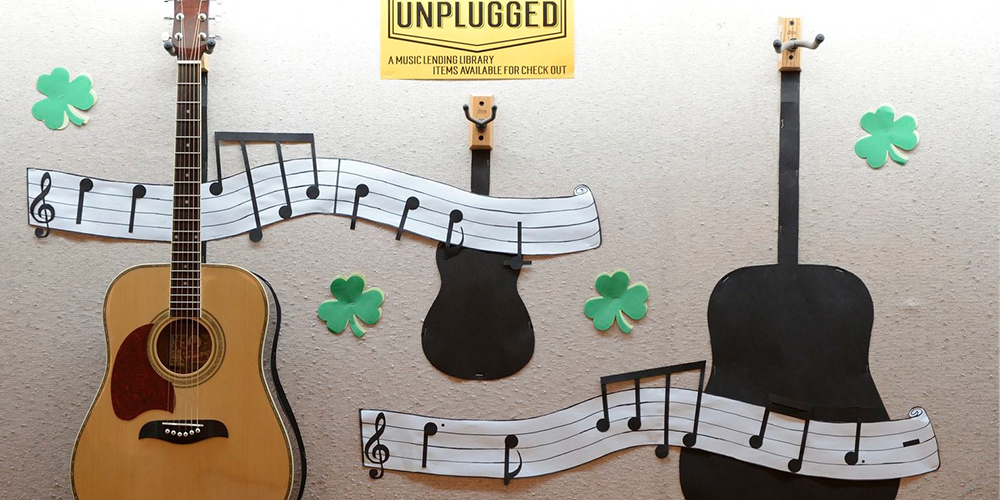Kayaks, ukuleles, neckties: The weird and useful things you can check out from local libraries

When you think about the most valuable cards in your wallet, you probably envision your credit and ATM cards. Here’s another one that should come to mind: your library card. These days, the nation’s 9,057 library systems let you check out a lot more than books.
Need a power tool, kayak, 3-D printer or Ninja Turtle-shaped cake pan? Your library might have one you can borrow. What about crafting or studio space? It might have you covered there, too. Some libraries provide access to courses on computers or graphic design. Many will let you borrow passes to local attractions such as zoos and museums. Others provide seeds and cuttings to check out; you can grow your own, then return seeds or cuttings to share with others.
Bottom line: If you don’t have a library card, you should get one, and if you do, it may be time to dust it off.
“A library is no longer the ‘shushing’ place you come to only for the books,” says Oliver Sanidas, executive director at the Arapahoe County library system in metro Denver. “We’re moving from the written word to learning through experience. One can be empowered through hands-on learning, be it checking out a GoPro video camera or . . . engraving a wine glass with a laser cutter.”
According to Manya Shorr, director of the Fort Worth library system, “It’s all about figuring out what a community needs and providing it.” In July, her system launched a mobile WiFi hotspot checkout, a boon for those without in-home Internet service. The system started with 80 devices at four of its 16 branches; demand was so great (the hotspots can be checked out for three weeks) that in October it expanded the service to 200 devices at eight branches.
In the recreation-oriented community of Payson, Utah, the library lends paddleboards and kayaks, including life jackets and car-attachment straps, as well as snowshoes. O’Fallon Public Library in Illinois has 41 fishing poles in its inventory.
New York Public Library’s Riverside Library lets patrons borrow fashion accessories including neckties, a Kenneth Cole briefcase or a Coach handbag for a networking event or job interview. Concord Free Public Library in Massachusetts lends an Orion StarBlast telescope kit with instructions, a constellation guide and headlamp.
Mid-Continent Public Library in Kansas City, Mo., offers educational programming for people who want to start a food truck business. To date, more than 400 would-be entrepreneurs have signed up for workshops in accounting, marketing and licensing, or scheduled one-on-one meetings with a small business specialist. Attendees even come from surrounding states.
Since 1979, California’s Berkeley Public Library has expanded its Tool Lending Library to 3,500 tools. Among the most requested items: weed eaters, extension cords, hedge trimmers and demolition hammers. Likewise, libraries in Finney County, Kan., have checked out cake pans of all shapes and sizes for decades.
For those interested in the ukulele, Tampa’s Hillsborough County Public Library Cooperative has 17 of the stringed instruments to take home and strum. Jackson County (Ore.) Library has 30 ukuleles — and a long waiting list.
Hundreds of libraries, including the D.C. Public Library, offer free access to Lynda.com classes, which normally cost $25 to $30 per month. The 3,000-plus courses include graphic design, 3-D animation, accounting and coding.
Systems across the country offer passes to local cultural institutions — look for names such as Museum Pass (Seattle), Culture Pass (New York City) or Discovery Pass (St. Joseph County, Ind.). In Miami, library patrons can check out a pass good for four people to any of 17 institutions, including the zoo, children’s museum and contemporary art museum.
And in another trend, libraries are carving out “makerspaces” — creative areas where patrons are encouraged to make a mess — and noise. Colorado’s Arapahoe Libraries offer staffed labs filled with laser cutters, routers, vinyl cutters, band saws, sewing machines and 3-D printers. There’s also a soundproof media lab where members can hook up an electric guitar and lay down some tracks, or create their own MTV sensation.
“While we continue to offer all the traditional items, customization allows patrons to borrow items instead of buying them,” says Loida Garcia-Febo, president of the American Library Association. “That saves them money, especially if they only need to use the item once or twice.”
Connie Spindler experienced that when she moved to Howard County, Md., last year and discovered that the library system’s nearby Elkridge Branch housed a DIY Education Center stocked with almost as many kinds of tools as a home improvement store.
Spindler, who needed to hang pictures and wall sconces, borrowed a stud finder, level and wire cutters. “I was blown away,” she says. “The library opened my mind to opportunities for things I could borrow. I didn’t have to spend money on something I need for one project, and the clerk even showed me how to use the tools.”
Spindler hopes to attend some DIY workshops — window-screen repair tops her list — and she has her eye on some knitting and crafting tools she may try out before purchasing. “It’s convenient. It’s free. And you get personalized service,” she says. “The bottom line is, I’m going back.”
Related Links: Read the story on Washington Post